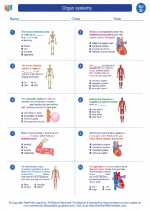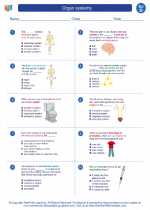Regulatory Systems
Regulatory systems are mechanisms in living organisms that coordinate and control various physiological processes to maintain homeostasis. These systems play a crucial role in ensuring that the internal environment of an organism remains stable, despite changes in the external environment.
Nervous System
The nervous system is a complex network of nerve cells and fibers that transmit signals between different parts of the body. It is responsible for receiving and processing sensory information, as well as coordinating motor responses. The main components of the nervous system include the brain, spinal cord, and peripheral nerves.
Key Concepts:
- Sensory neurons transmit signals from sensory organs to the central nervous system.
- Motor neurons transmit signals from the central nervous system to muscles and glands.
- The brain is the control center of the nervous system and is responsible for processing and interpreting information.
- The spinal cord serves as a pathway for nerve signals traveling to and from the brain.
Endocrine System
The endocrine system consists of a network of glands that produce and secrete hormones to regulate various bodily functions. Hormones are chemical messengers that travel through the bloodstream to target cells, where they elicit specific responses. The major glands of the endocrine system include the pituitary gland, thyroid gland, adrenal glands, pancreas, and reproductive glands.
Key Concepts:
- Hormones play a key role in regulating metabolism, growth and development, tissue function, and reproductive processes.
- The pituitary gland, often referred to as the "master gland," controls the functions of other endocrine glands.
- The thyroid gland regulates metabolism and energy production in the body.
- The adrenal glands produce hormones that help the body respond to stress and regulate salt and water balance.
Immune System
The immune system is a complex network of cells, tissues, and organs that work together to defend the body against harmful pathogens, such as bacteria, viruses, and parasites. It also plays a role in detecting and eliminating abnormal or damaged cells within the body.
Key Concepts:
- White blood cells, including T cells, B cells, and macrophages, are key components of the immune system and are involved in recognizing and destroying pathogens.
- The lymphatic system, which includes lymph nodes, spleen, and thymus, plays a crucial role in the immune response by filtering and trapping pathogens and producing immune cells.
- Antibodies are proteins produced by B cells that specifically target and neutralize pathogens.
- The immune system has memory cells that enable it to recognize and mount a faster response to previously encountered pathogens.
Understanding regulatory systems is essential for comprehending how living organisms maintain internal balance and respond to changes in their environment. This knowledge is fundamental to the field of biology and has broad implications for human health and medicine.
.◂Science Worksheets and Study Guides Fourth Grade. Organ systems

 Worksheet/Answer key
Worksheet/Answer key
 Worksheet/Answer key
Worksheet/Answer key
 Worksheet/Answer key
Worksheet/Answer key
 Vocabulary/Answer key
Vocabulary/Answer key
 Vocabulary/Answer key
Vocabulary/Answer key
 Vocabulary/Answer key
Vocabulary/Answer key
 Vocabulary/Answer key
Vocabulary/Answer key
 Vocabulary/Answer key
Vocabulary/Answer key
